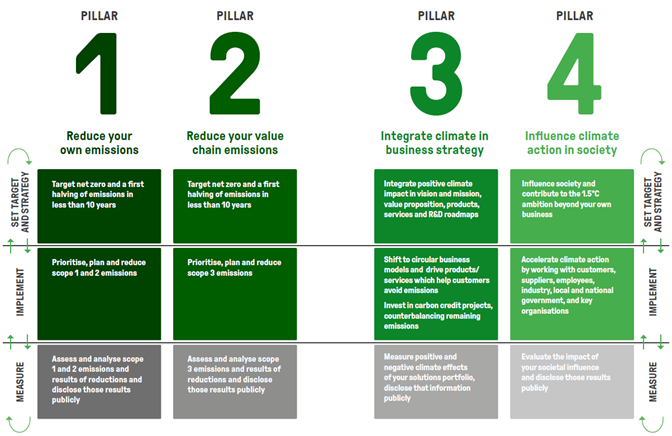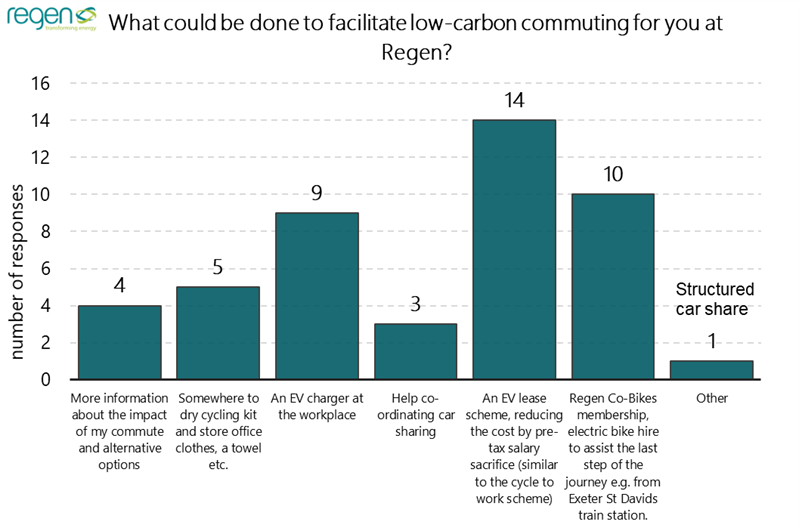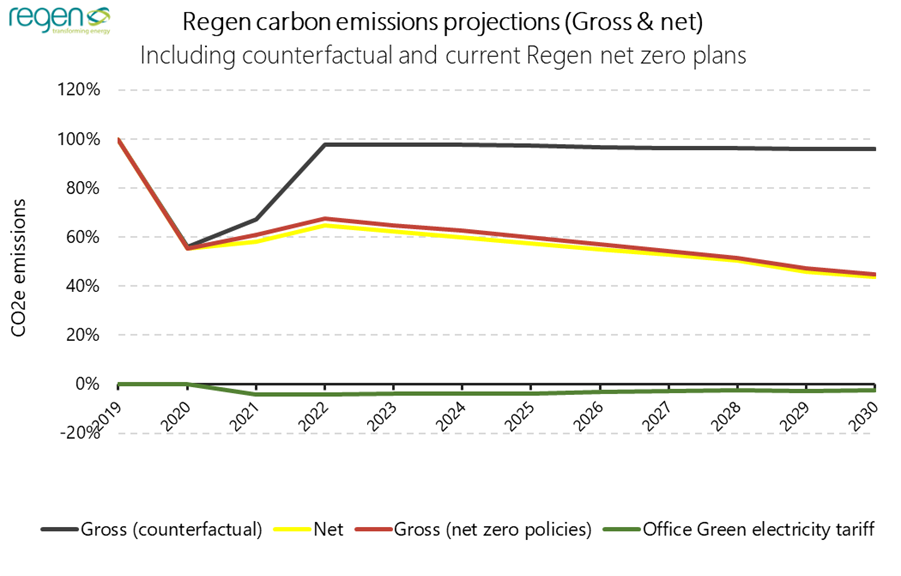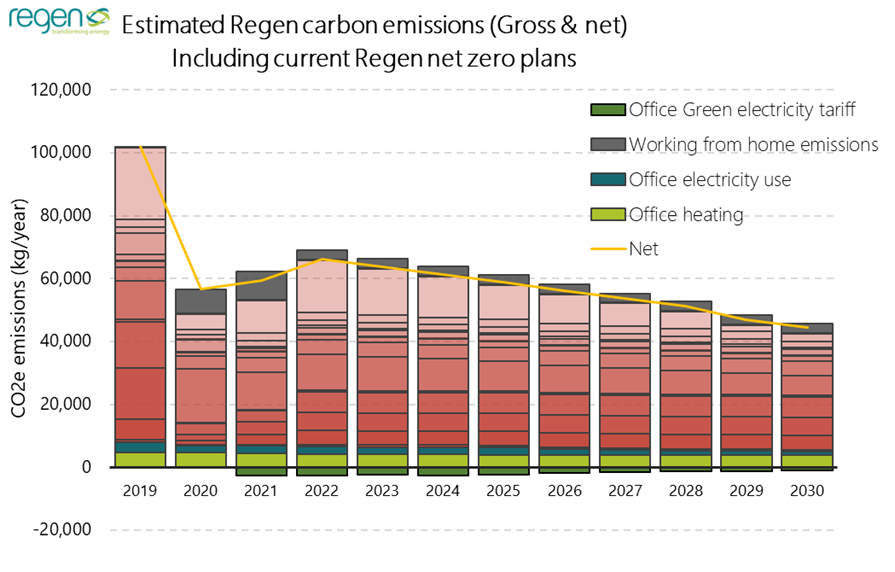Mark Howard, Regen’s project manager and Sustainability Task Force lead, sets out our action plan for reducing Regen’s business emissions to net zero by 2035.

Race To Zero – creating action plans
This is the fourth in our ongoing series of blogs documenting Regen’s internal work to become net zero by 2030. Our first blog provides some background on this work and the Race to Zero and can be found here. Our second which covers the nebulous topic of ‘green tariffs’ can be found here. The third, discussing some of the interesting things we learnt from tracking our emissions, can be found here.
Updated strategic context for 2020
Regen started on the journey of greenhouse gas assessments in mid-2019. In March 2021 Regen joined the UNFCCC Race to Zero, via the SME Climate Hub, making a commitment to meet net zero by 2030. This has strengthened the focus of our internal work to address emissions, as well as provided a strategic framework to align our work with.
The SME Climate Hub framework is broken down into four pillars, as shown in the diagram.

We have examined each source of emissions that we have reported on (detailed here), engaged with staff through workshops and surveys, looked to best practice guidance, and used this to analyse what changes we can make to reduce emissions.
These changes have been mapped against the pillar structure outlined above into the following action plans.
Pillar 1 – reduce your own emissions
In many ways for Regen this is the most straightforward to address as we deal with energy issues every day and we have a few former energy managers in our midst, keen to measure and reduce our energy consumption.
Pillar 1 action plan
- Continue best practice energy use in office – lighting and computers off when not in use, possibly replacing server with cloud server, in winter minimising drafts (within Covid guidance) and correct use of radiator thermostats.
- Continue with existing best practice business travel policy – favouring low carbon and avoiding air travel where possible, investigate use of car club EVs as an alternative to use of private ICE vehicles.
- Investigate longer term options for a lower carbon office.
Pillar 2 – reduce your value chain emissions
Quantifying and tackling our scope 3 emissions has been one of the more interesting and challenging aspects of our net zero work.
A specific area of interest has been trying to find more ways to support Regen staff in commuting in a low carbon way. Regen has, for a long time, offered access to the bike to work scheme, provided secure bike storage, offered flexible hours around public transport, and even loans to fund rail season tickets. To better understand how well these are working and to develop new approaches we have run an internal commuting survey for the last two years.
The most recent survey showed that most staff were aware of existing policies designed to facilitate low-carbon commuting, but we could do more to ensure that everyone is aware and understands these, so we will develop our staff handbook to be clearer.
From the survey we had a number of potential policies suggested to support low-carbon commuting, as well as how these might change staff behaviour, the results are shown in the charts.

Although only two members of staff currently expect to switch to an EV in the near future, 14 expressed interest in a scheme to support the purchase of an EV, with nine expressing interest in EV charging at the office, and seven saying that these actions would help them buy an EV.
We are now working to implement EV charging, an EV salary sacrifice scheme and more assistance with the ‘last leg’ of staff commutes into the Exeter office, as highlighted in the pillar 2 action plan below.
Pillar 2 action plan
- Create resources to promote low-carbon commuting to staff (commute calculator tool, ‘low carbon last leg’ commuting map of Exeter), provide support for bike to work, rail travel season ticket loans, flexible work hours and location.
- Pursue EV charging in the office (sub-metering to account for potential increase in scope 2 emissions).
- Set up EV salary sacrifice scheme for staff commute.
- Run events online where beneficial.
- Encourage low-carbon travel to in-person events and gather data on how delegates travel for improved understanding and awareness.
- Offer a revised events menu to offer meat-free catering at events, with possible exception for large functions where there is scope to procure low carbon/organic meat.
- Research to better understand impacts of pension funds, support staff to understand how their pension fund is invested and how they can control this.
- Continue to focus on low-carbon business travel, use of car club EVs and avoiding travel where logical, with flights avoided where possible.
- Update procurement policy to encourage suppliers to join race to zero. Ideally, we will insist on this from 2025 where we are able.
Pillar 3 – integrate climate in business strategy
As a mission-led organisation aiming to accelerate the decarbonisation of the energy system, we hopefully have a head start here. Nonetheless, the work we have carried out in the last two years has allowed us to better understand the steps we need to take towards net zero, update our internal policies and be confident that we are on the right track.
Pillar 3 action plan
- This is clearly at the heart of our mission.
- Formed internal sustainability task force in 2019.
- Updated environmental policy with net zero commitment in 2020.
- Update procurement policy to encourage suppliers to join race to zero. Ideally, we will insist on this from 2025 where we are able.
- Continue to support ‘true green’ electricity tariff, investigate supporting staff to do the same to tackle working from home emissions.
- Identify suitable carbon credit projects to address current residual emissions.
Pillar 4 – influence climate action in society
Communicating with stakeholders across the energy industry is a key part of our work, and it is no different with our approach to net zero – hopefully if you are reading this you will agree that we are working hard to communicate and encourage others to take steps towards net zero.
Pillar 4 action plan
- Write blogs and newsletters for Regen members and wider community.
- Run and attend industry events.
- Work with our members to influence climate action in society.
How far does this take us?
Indicative modelling of where these action plans could take us is shown in the charts below. Of course, the real trajectory will be dependent on a number of variables, some of which we cannot control, so we will continue to track and report on emissions to check our progress.


These projections don’t currently include any carbon offsetting that could be used to reduce our net emissions. Having recently researched green tariffs and ported our electricity to a ‘true green’ tariff we will be including a reduction against our electricity use for 2021. We will shortly be looking into how carbon offset and reduction projects can be used to help make up the shortfall as we work to reduce our emissions towards 2030.
